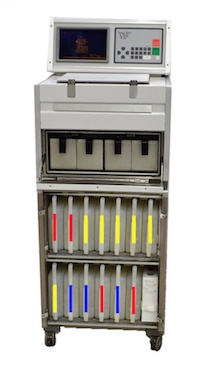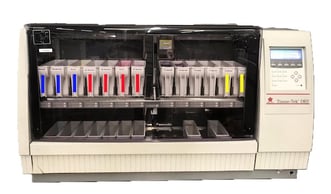Subscribe to our Blog
Updated as of April 28, 2025
With the right solvent distillation unit, your lab can dramatically reduce how much it spends on purchasing solvents and disposing of waste. You may think that spend reduction is the greatest benefit delivered to your lab by solvent recycling, but it’s really only one part of the bigger picture.
Solvent usage affects many of your lab’s processes. Waste solvent recycling improves those processes, bringing sustainable value beyond economics.
When you recycle and become your own solvent supplier—recovering up to 95% of available solvent at high-concentration levels—there are many ways your lab’s processes will be optimized.
1. Daily tasks will be simplified
In terms of process flow, a solvent distillation unit will simplify how your lab technicians can go about their daily tasks.
When you have a recycler in your lab, you no longer need to take dirty solvent to a stocking room or basement to dispose of it. Many labs, whether histology, veterinary or chemistry, reside in older buildings, which often require flammables to be stored in basement areas or exterior facilities. When solvents are recycled, they remain in your lab, so technicians don’t need to spend valuable time going back and forth to get more clean solvents and dispose of waste. This greatly reduces your cycle time and improves overall process flow.
The image below shows just how easy it is to manage solvents using a laboratory solvent recycler. Using only colored tape, you can create a simple color-coding system at your tissue processor and/or stainer stations. In the example below, red tape means “discard,” yellow means “alcohol to recycle” and blue means “xylene to recycle.”

You can then apply the same color-coding system to your lab’s fractional distillation unit, as depicted in the image below. A lab technician would then replace a “to recycle” container and set the unit to run. You can see below that recycled xylene is separated from both the alcohol and/or paraffin using one simple process.
2. Less staff will be required for solvent management
Lab supervisors often worry about staffing, and for good reason. Today, labs are often asked to do more with fewer staff members and lab consolidation is quite common. Given this trend, the labs of the future are going to need solvent distillation machines more than ever.
Recyclers can help labs run smoothly with less staff. Fewer man-hours need to be dedicated to the purchase and disposal of solvents. And because fractional distillation recyclers are automated, they can run entire cycles absent of a technician (in many cases, they’re run overnight). In fact, recyclers require less than a half-hour of attention per week (dependent, of course, on how much solvent a lab uses). These machines are also easy to operate. They take 15 minutes to charge and 15 minutes (or less) to process a batch—once a solvent mixture is loaded into a machine, a technician can simply hit a button and walk away.
3. Lab space will be saved
Physical space is another common concern for lab managers. After all, how can a new piece of equipment optimize processes if it’s taking up valuable space? Innovative types of solvent distillation machines are designed with space-efficiency in mind. Some even come in benchtop versions that take up no floor space at all.
Machine footprint aside, labs also free up space by storing fewer consumables. When you’re recovering up to 99% of a solvent after each use, that’s less solvent you need to buy—and store. Overall, recyclers substantially reduce the storage space your lab needs to set aside for solvents.
4. Safety will be improved
Employees are your most important asset in the lab. Solvent distillation units help protect your employees. As closed units with vapor filtration, recyclers inhibit fumes from escaping and thereby help prevent fires and eliminate employee exposure to harmful vapors.
5. Solvent waste will be reduced
There’s an additional benefit of having a closed unit: It prevents evaporation. Often, labs using xylene will store it in open trays. Because of its boiling point, xylene evaporates very quickly, so in this environment, a considerable amount of xylene is lost before it’s used even once.
And, of course, by recycling solvent, you’re not disposing of it after one use; you’re using it many, many times and producing a fraction of the waste (and thereby exponentially reducing the amount of solvent you need to purchase—see number 6 below).
6. Solvent spend will be reduced
There’s no doubt that waste solvent recycling will economically benefit your lab. Lab managers and their purchasing counterparts tend to frequently focus on spend reduction, not considering the total value provided by a fractional distillation unit/still, but the cost savings realized by labs is so significant that it’s easy to understand the heightened focus.
At CBG Biotech, we see labs recoup the total cost of a laboratory fractional distillation unit within two years (or less), on average.
The example below illustrates just how substantial your lab’s annual savings can be, even if you only use moderate amounts of solvent. Higher volumes multiply savings at a rapid rate.
|
Example of Annual Savings Realized with Xylene Recycling |
|
Annual Usage |
500 gallons (two gallons per working day assumed) |
|
Cost Per Gallon |
$15.00 |
|
Total Solvent Cost |
$7,500 |
|
Annual Disposal Cost (estimated at $7.70/gallon) |
$3,850 |
|
Total Annual Solvent and Disposal Cost |
$11,350 |
|
Projected Savings with Recycling |
Total Annual Cost: $11,350 |
7. Waste reduction, sustainability and environmental impact
Recycling is the cornerstone of many sustainability or “green” initiative. Waste solvent recycling reduces the volume of hazardous waste generated by a laboratory, making it a crucial element in any hospital or university lab’s overall recycling program. By minimizing hazardous waste, labs contribute to broader environmental goals and support internal sustainability efforts.
In addition to supporting green initiatives, solvent recycling can also play a critical role in meeting regulatory and accreditation requirements.
8. Accreditation and regulatory-adherence initiatives will be supported
In the not-so-distant past, hazardous waste could be casually poured down the drain; but today, states and municipalities are regulating waste disposal more stringently, mandating what can and cannot be done with waste. Solvent recycling is a simple solution that helps labs adhere to federal, state and local regulations.
Most importantly, solvent recycling will potentially help your lab achieve College of American Pathologists (CAP) accreditation, which ensures your lab:
- Meets Clinical Laboratory Improvement Amendments (CLIA)
- Is compliant with the most comprehensive, scientifically endorsed laboratory standards
- Maintains accuracy of test results, which guarantees an accurate patient diagnosis
- Increases the value it brings to organizations, customers and patients
- Promotes safe laboratory practices of VA Directive 0052, as well as compliance and achievement
- Promotes compliance and achievement of CAP Laboratory General Checklist requirement GEN 70700: Is there a program to reduce the volume of hazardous waste that is generated by the laboratory?
Learn More
At CBG Biotech, we rely on a set of customer-first core values that promote ethical and honest behavior, personal accountability, and teamwork to deliver the solutions that set customers up for success. If you have a question or would like more info, please call 800-941-9484 (and press option 3 for support) or get in touch with us online today!
Check out these other helpful resources:
- Blog Post: The Importance of Maintaining the Interior of Your Laboratory Recycler
Maintain the interior operation of your PathTrue™ Solvent Recycler laboratory equipment with EZ Clean. - Blog Post: How Much Does Using a Solvent Distillation Unit in Your Lab Cost?
Learn how much solvent distillation equipment costs and how much your laboratory will need to spend to operate and maintain your lab distillation system. - Video: Simple vs. Fractional Distillation
What is fractional distillation? What is simple distillation? This video provides a brief overview of distillation, the differences between simple and fractional distillation, applications these processes are used in and how these processes work.



COMMENTS